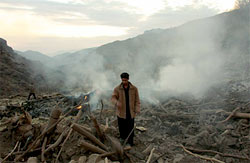 Susan sat on her bed, looking frightened and sad. The 27-year-old had lost the lower half of her left leg when at 2 a.m. Dec. 16, Turkish fighter planes dropped four bombs on her home in a village along the northeastern Iraq-Iran border.
Susan sat on her bed, looking frightened and sad. The 27-year-old had lost the lower half of her left leg when at 2 a.m. Dec. 16, Turkish fighter planes dropped four bombs on her home in a village along the northeastern Iraq-Iran border.
"When the fourth bomb exploded, everything was fire, and I heard my daughter screaming," recounted Susan's father. For several hours planes flew overhead. The blasts also killed their cows and sheep. "It was several hours later when we were able to carry her to a car that could take her to a hospital," he said. The next day they were among the estimated 3,000 persons or 800 Iraqi Kurdish families who fled border areas out of fear.
Of all Iraqis, the Kurds have been the most supportive of U.S. military presence in their country. However, U.S. policies concerning Turkish incursions into Iraqi border areas have not only caused suffering to the Kurdish victims, they have increased Kurds' anger toward and mistrust of the U.S. Such policies perpetuate the cycles of violence in these conflicts, when what is needed is leadership toward peaceful resolution.
"I have no hope for my life now," Susan told us. "I am not good physically or psychologically. I cry all day long."
This was the Christian Peacemaker Teams Iraq team's second visit to Susan's family as part of a project to monitor this border conflict and be prepared to accompany displaced families back to their villages. Tomorrow Susan has an appointment with a Kurdish organization to assess whether she is able to participate in their six-month rehabilitation and vocational program for amputees.
Susan's family isn't the only one questioning the role the U.S. has taken in allowing Turkey to fly over Iraqi air space in its anti-terrorism campaign. Kurdish Iraqis express little support for the PKK (Kurdistan Workers Party), whom they consider terrorists, operating in more remote areas of the Qandil Mountains. They expected the U.S., as the occupying force in Iraq, to protect civilians in their care. Many Iraqi Kurds believe that Turkey's real motives for Turkey's invasions into Iraq are to sabotage the possibility of a strong independent Kurdish state in northeastern Iraq, and to take control of the oil fields of Kirkuk province.
In the past five years, the actions and policies of the U.S. government have eroded most of the initial gratefulness Iraqi people had for getting rid of Saddam Hussein. Excessive violence, domination of Iraqi political and economic structures, and the U.S.'s failure to rebuild the physical, social, and medical infrastructures of Iraqi society feed into the increasing anger and violent resistance that have emerged. Peggy Gish is a fulltime worker with Christian Peacemaker Teams, which seeks to enlist the whole church in organized, nonviolent alternatives to war and places teams of trained peacemakers in regions of lethal conflict. CPT initiated a long-term presence in Iraq in October 2002. She is the author of Iraq: A Journey of Hope and Peace.
Peggy Gish is a fulltime worker with Christian Peacemaker Teams, which seeks to enlist the whole church in organized, nonviolent alternatives to war and places teams of trained peacemakers in regions of lethal conflict. CPT initiated a long-term presence in Iraq in October 2002. She is the author of Iraq: A Journey of Hope and Peace.
Got something to say about what you're reading? We value your feedback!
